Our Messiah and Sing-Along Messiah concerts will feature an amazing cast of soloists with soprano Amanda Forsythe and mezzo-soprano Krisztina Szabó making their Tafelmusik debut, and Tafelmusik favourites tenor Colin Balzer, and baritone Tyler Duncan. We sent them a few questions and here is what they had to say:
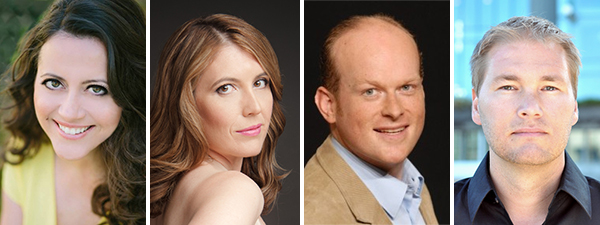 Amanda Forsythe (soprano), Krisztina Szabó (mezzo-soprano), Colin Balzer (tenor), and Tyler Duncan (baritone)
Amanda Forsythe (soprano), Krisztina Szabó (mezzo-soprano), Colin Balzer (tenor), and Tyler Duncan (baritone)
How did you come to decide to sing?
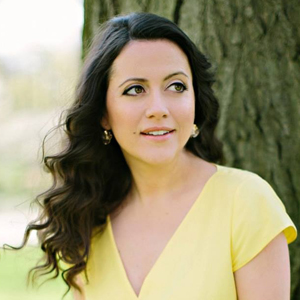 Amanda Forsythe
Amanda Forsythe
Amanda Forsythe: I’ve enjoyed singing since I was a child, when I sang in choirs and local theatrical productions. I studied voice and piano in high school, and began college as a biology major with a strong interest in music. It turns out I was better at singing than science!
Krisztina Szabó: I started singing as a child, spending six years in the Toronto Children’s Chorus, and loved it, but never considered it a “career choice” when deciding what to major in at university. So, I entered the University of Western Ontario with aspirations of being a music teacher, as a piano major. But I wanted to keep singing, so I started taking voice lessons on the side with Dr. Darryl Edwards, who now teaches at the University of Toronto. The more I sang, the more I loved it—it felt natural, like the truest expression of who I am. Then I got a couple of roles—in the Gilbert & Sullivan Society, as well as the opera that the university put on, and I caught the performing bug. So, I ditched the Education track and decided to pursue post-graduate programs in Voice Performance … and the rest is history.
Colin Balzer: When I entered grade 11, I had the good fortune to have a choir director who had just returned from finishing his masters in conducting. He was burning with inspiration and ideas, and it was contagious. Up until then I had never sung in a choir but had played various instruments. Under his direction and encouragement, I began to realize that I might have more to say musically as a vocalist than an instrumentalist.
Tyler Duncan: When I was little I would make up songs while playing with Lego. My Nana, who was a big fan of Sibelius, noticed that I made up some lovely songs and was usually in tune. She suggested I join a choir. From then on, there really wasn’t much else in life that I wanted to do.
What was your first music gig?
AF: My first paid job was singing backup vocals to Joey Lawrence on a Romper Room record when I was eight years old. I got $40 for that gig!
KS: My first paid music gig ever was as soloist/section leader for a church choir in London while going to school. But my “big break” was being accepted into the Canadian Opera Company’s Ensemble Studio programme. My first role at the COC was playing “Clothilde” in Norma. At the time, everyone kept telling me that it was Joan Sutherland’s first role, too … no pressure there!
CB: Oddly enough, my first professional job as a soloist was a Sing-along Messiah with a community choir in Fort Langley, BC.
TD: Playing trombone in a Brass Quintet. We played Christmas carols in Victoria BC. We were TERRIBLE. My first professional singing gig was Monteverdi madrigals for Early Music Vancouver. Colin Balzer was the tenor soloist. It is wonderful that we are still singing together a couple of decades later.
What is your “guilty pleasure” music to listen to?
AF: I really enjoy listening to Broadway musicals, and my 6-year-old is keeping me current on today’s pop music.
KS: Some of my friends make fun of me, but I listen to pop music—the latest hits—and can sing along with most of the songs on the radio. I listen until the fact that they are mindless and repetitive starts to get to me, at which point I put on CBC Radio.
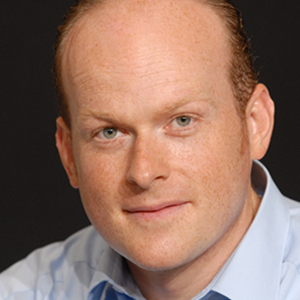 Colin Balzer
Colin Balzer
CB: Take 6. I finally had the opportunity to hear them live after being a fan for many years. They are as stunning live as they are on their recordings.
TD: Jazz, funk, and (intelligent) rap music.
What are the last three recordings you’ve listened to?
AF: Joseph and the Amazing Technicolor Dreamcoat, Handel’s Aci e Galatea, and Alison Krauss singing I’ll Fly Away.
KS: Well, I was preparing for a concert, so I was listening to a Hungarian singer, Magda Kalmár, singing some Lehár operetta. Also, Katalin Karády singing some ‘50s Hungarian lounge music.
CB: Nature Boy, Lucky Luke, and Bad (sung by The Real Group, live from Japan)
TD: The Rainbow Connection, The Bare Necessities, and the theme song from Paw Patrol — I have a toddler …
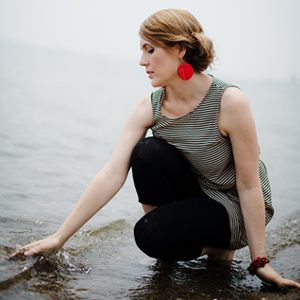 Krisztina Szabó
Krisztina Szabó
What is your favourite thing to do on a day off?
AF: I’ve got two small boys at home, so there aren’t really any “days off.” When I’m travelling without them, I enjoy being a tourist in new cities and catching up on reading.
KS: Sleep and Netflix. And sleep. And more Netflix. And then sleep again.
CB: Living in Germany, the opportunity to see a movie without subtitles or overdubbing is sometimes hard to pass up. I also love finding local independent coffee roasters and cafés.
TD: Spend time with my son: he is very cute.
What is the most challenging aspect of singing Messiah for you?
AF: Technically, “Rejoice greatly” is the only tricky piece for soprano—the rest is just about spinning your most gorgeous sound and connecting with the moving texts. But every conductor likes to allocate the arias differently, and sometimes you get to sing something new—this year I get to take a crack at the arioso “Behold and see,” which is a first for me!
KS: For me, “But who may abide” is the most challenging aria of the night, because of where the coloratura lies. It’s a great aria and I want to do it justice!
CB: The challenge (which I love) is to try and make it fresh every time. Can I go deeper into the text? Does a particular ornament still make sense both musically and rhetorically? My interpretation needs to be a living, breathing, and growing thing, to leave no room for auto pilot or routine.
TD: Trying not to sing along with the choir the whole time! The most wonderful challenging aspect is keeping the music fresh each year, not relying on the way it was sung last season, but finding new things in the music to bring out.
What Messiah part do you especially look forward to?
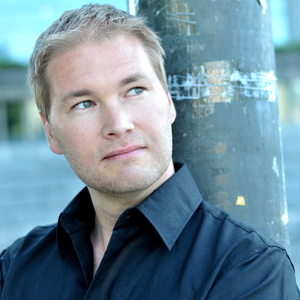 Tyler Duncan
Tyler Duncan
AF: I love the silence just before the final two “amens,” after you’ve been somewhat hypnotized by the extended “Amen” fugue. It always comes as a shock.
KS: It may sound cliché, but I absolutely love when the “Hallelujah” chorus is sung, particularly when the soloists and audience get to join in the fun. There is nothing quite like a room full of people raising their voices together singing that chorus!
CB: I always love the passion sequence of recitatives and arias. It’s a huge turning point in the piece. This is the Messiah at its most serious, its most accusatory, until that wonderful moment where the music and text shifts to “But thou didst not leave his soul in hell.” From there on out it’s a wonderful and celebratory rising action that continues to gain momentum right up until the end of the piece.
TD: The viola part.
Hear our wonderful guest soloists perform in Messiah at Koerner Hall, TELUS Centre, from Dec 14-17, 2016. Tickets are available here. Join in the singing at the 30th anniversary of Sing-Along Messiah at Massey Hall, Dec 18.
